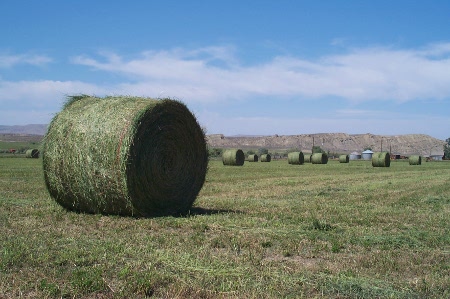Supreme Court defers GMO alfalfa decision to USDA

Both sides are claiming victory following a landmark Supreme Court ruling – the first high court decision concerning genetically modified organisms (GMOs).
The fact that most mainstream media outlets are advertising the outcome of Monsanto v. Geertson Seed Farms as a win for the plaintiff is a testament to the biotech giant's impressive PR spin machine. However, even a cursory reading of the justices' opinions reveals that Monsanto's legal battle to commercialize their Roundup Ready Alfalfa seed has just begun.
Monsanto is celebrating the Court's 7-1 reversal of a California district court's injunction which barred the company from selling its genetically modified alfalfa seed. But its not quite the victory they were hoping for. On the other hand, opponents of GMOs are calling the ruling a “significant victory,” one which will keep Roundup Ready Alfalfa (RRA) seeds – genetically engineered to resist the herbicide Roundup – banned from sale or planting until the Federal government prepares an environmental impact statement and officially deregulates the crop.
That's right, the ban on RRA seeds still stands. To sell or plant them remains an illegal act. “This point, which seems to be lost in some news reports, is actually a huge victory for the Center for Food Safety and - most importantly - for the farmers and consumers who we represent,” writes Andrew Kimbrell, Executive Director of the nonprofit group representing the defendant in the case Monsanto v. Geertson Seed Farms. “It's a significant victory in our ongoing fight to protect farmer and consumer choice, the environment and the organic industry,” says Kimbrell.
The majority opinion, authored by Justice Samuel Alito, held:
“In sum…the vacatur of APHIS’s deregulation decision means that virtually no RRA (Roundup Ready Alfalfa) can be grown or sold until such time as a new deregulation decision is in place, and we also know that any party aggrieved by a hypothetical future deregulation decision will have ample opportunity to challenge it, and to seek appropriate preliminary relief, if and when such a decision is made.” (Opinion at p. 22).
In addition, the ruling, which did not touch on arguments presented by Monsanto regarding application of federal environmental law, goes a long way toward strengthening the National Environmental Policy Act and other environmental laws, Kimbrell claims.
So why did the high court reverse the California district court's original injunction, giving Monsanto the ostensible “victory”? Mr. Kimbrell sums it up best in his recent contribution to The Huffington Post:
“The Supreme Court ruled that an injunction against planting was unnecessary since, under lower courts' rulings, Roundup Ready Alfalfa became a regulated item and illegal to plant. In other words, the injunction was "overkill' because our victory in lower federal court determined that USDA violated the National Environmental Policy Act and other environmental laws when it approved Roundup Ready alfalfa. The court felt that voiding the USDA's decision to make the crop legally available for sale was enough.”
In fact, Kimbrell believes that deferring the decision to regulatory agencies and ruling “very narrowly” was extremely beneficial in mitigating the significant threat RRA poses to organic markets, the fastest growing sector of US agriculture. The USDA has already stated that legalizing the crop is at least a year away, and “even then,” says Kimbrell, “a deregulation move may be subject to further litigation if the agency’s analysis is not adequate.”
What's more, the Court recognized that transgenetic contamination is injurious to organic and conventional farmers and that any such damaged parties have standing to challenge future GMO commercializations in a court of law. “The Court opinion supported the Center's argument that gene flow is a serious environmental and economic threat,” writes Kimbrell. “This means that genetic contamination from GMOs can still be considered harm under the law, both from an environmental and economic perspective.”
John Paul Stevens – the only justice to dissent – declared, "It was reasonable for the court to conclude that planting could not go forward until more complete study ... showed that the known problem of gene flow could in reality be prevented."
Three states, including California, filed amicus briefs in support of Geerston Seed Farms and the Center for Food Safety. The defense's arguments and the background of the case have been summarized here.
The public health/environmental dangers associated with biotech crops such as RRA and Bt corn have been highlighted frequently in the news. In May, the NY Times ran an article examining the link between 'superweeds' and overuse of Monstanto's Roundup herbicide, but it skirted the issue of gene flow from genetically altered crops to feral plant species with whom they cohabitate.




